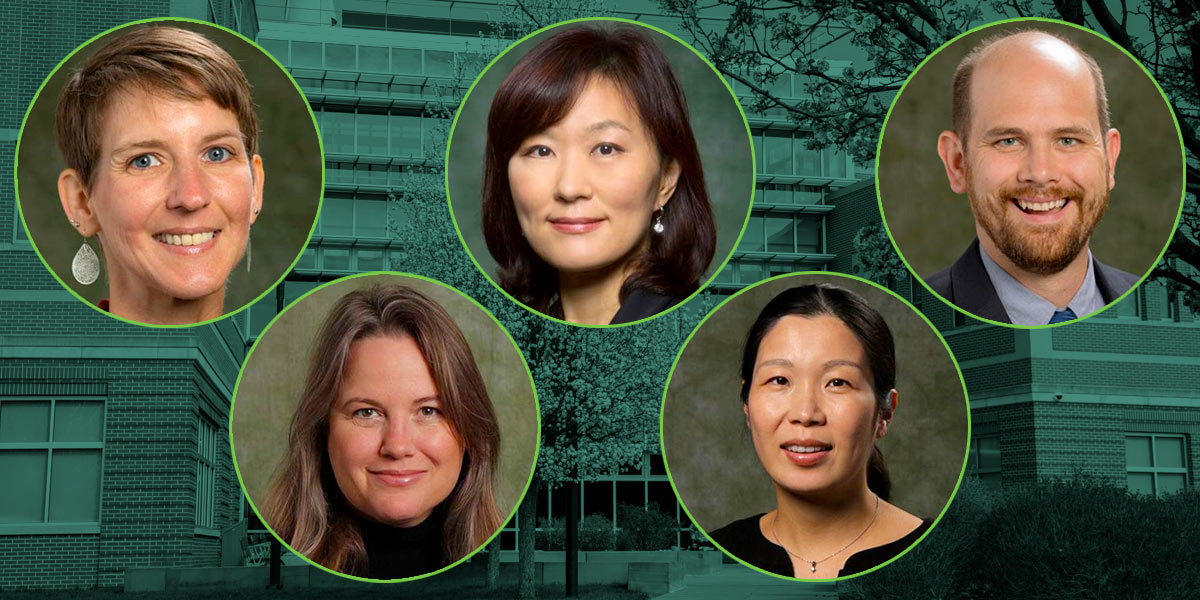Five CCPA faculty earn annual Research Excellence Awards
Competitive awards for 2022-23 were handed out based on faculty research proposals

Their work is wide-ranging: studying how to support multilingual communities, seeking ways to improve workforce development for college graduates with disabilities, exploring how referral systems in community schools can link students with needed services and even discovering how an app can help families talk more about engineering.
Faculty in the College of Community and Public Affairs (CCPA) are studying these concepts and five have been selected for the 2022-23 annual Research Excellence Awards.
This competitive, seed-grant program provides initial support for proposed collaborative research projects that have strong potential to attract external funding. Recipients receive funds from CCPA and the Division of Research.
Here is more about the awards and their research proposals:
Hoe Kyeung Kim, Teaching, Learning and Educational Leadership
Hoe Kyeung Kim, an associate professor in Teaching, Learning and Educational Leadership (TLEL), along with Sungdai Cho, a professor in the Department of Asian and Asian American Studies, received $11,340 for their proposal, Supporting a Multilingual Community.
The study aims to investigate the influence of a person’s first language on how they acquire a system of reference in learning how to communicate in a different language — in this case, how native English speakers transfer their understanding of their language to learn Korean. Kim and Cho said they expect the findings to reveal patterns of reference language learners have employed and contribute to developing effective teaching methods.
Hyejung Kim, Teaching, Learning and Educational Leadership; John Zilvinskis, Student Affairs Administration
Hyejung Kim, an assistant professor in Teaching, Learning and Educational Leadership and John Zilvinskis, an assistant professor in the Department of Student Affairs Administration, along with Brett Ranon Nachman of the North Carolina State School of Education, received $15,000 for their proposal, Pathway to Science, Technology, Engineering, and Mathematics (STEM) Employment for Autistic Students.
With autism diagnoses increasing, the research centers on the growing expectations from autistic high school students for college education in STEM fields, which would help diversify the workforce. Current college enrollment and STEM employment rates do not reflect those increasing interests and needs. The research team plans to apply for major federal grants in support of improving workforce development for college graduates with disabilities.
Naorah Rimkunas, Teaching, Learning and Educational Leadership and Social Work
Naorah Rimkunas, an assistant professor in Teaching, Learning and Educational Leadership and in the Department of Social Work, received $9,400 for her proposal, Equity-Focused Referral Systems in Community Schools.
Within community schools, referral systems are used to mobilize support around academic, behavioral, social and emotional growth in order to help students connect to services they need. Since little research has been done looking into the effectiveness of referral systems in community schools, this study uses mixed methods to explore how well the referral systems are implemented and whether they are equity-focused, to aid in future work in those schools.
Amber Simpson, Teaching, Learning and Educational Leadership
Amber Simpson, an assistant professor in Teaching, Learning and Educational Leadership, received $4,260 for her proposal, Utilizing the Remind App to Engage Families in Engineering Talk.
Based on research documenting how talking about science concepts with family and friends is one of the most influential informal learning experiences to develop and pursue a career in STEM, the research involves sending prompts via the Remind app to family participants every one-to-two weeks. The goals include understanding how to use the app as a research tool, examining a shift in how families perceive engineering concepts and investigating shifts in children’s decision-making regarding pursuit of an engineering career through talking about the subject with family members.

